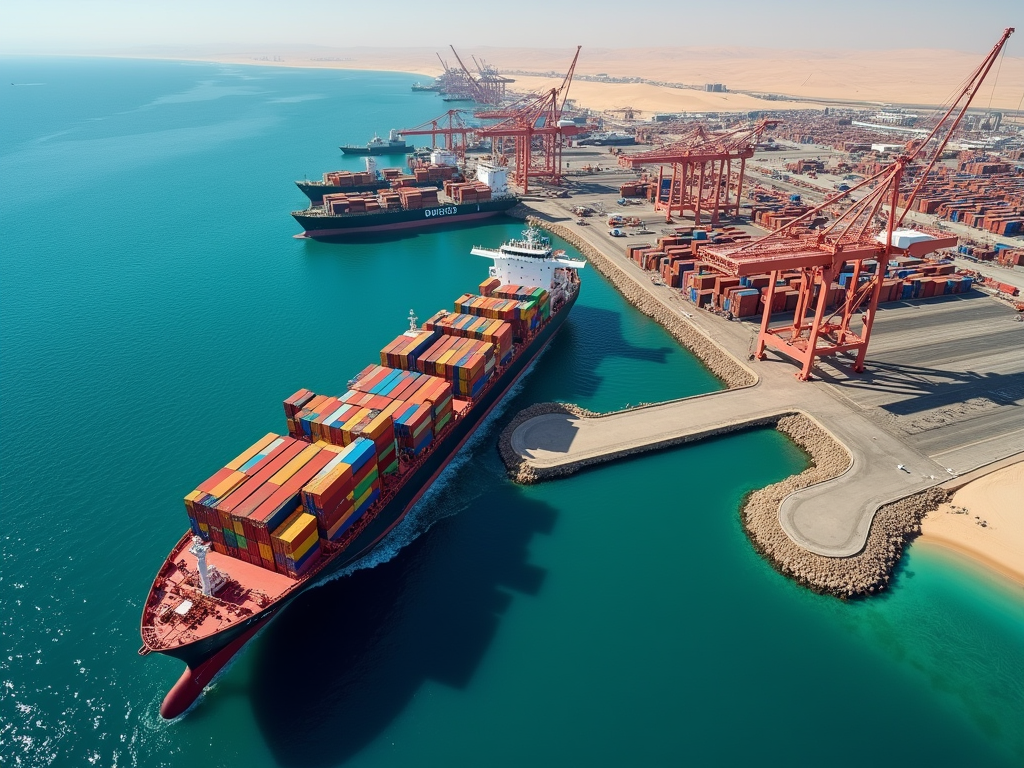Blockchain technology is revolutionizing supply chain management in Dubai by enhancing transparency, security, and efficiency. As a critical hub for global trade, Dubai is leveraging blockchain to address challenges such as counterfeiting, delayed shipments, and inefficient processes. With its decentralized, immutable ledger system, blockchain enables all stakeholders in the supply chain—from manufacturers to consumers—to track products in real-time, reduce fraud, and streamline operations. In this article, we will explore how blockchain is transforming supply chain optimization in Dubai, highlighting its key benefits and implementations.
Understanding Blockchain Technology

Before diving into its role in supply chain optimization, it’s essential to understand what blockchain is. Blockchain is a distributed ledger technology that securely records transactions across multiple computers. Each transaction is grouped into blocks and linked in chronological order, creating a chain of information that is nearly impossible to alter. This feature of blockchain ensures the integrity and authenticity of data, making it particularly appealing for supply chain applications where trust and traceability are paramount. Here are the key characteristics of blockchain technology:
- Decentralization: Eliminates the need for a central authority.
- Transparency: All participants can see the same data, fostering trust.
- Immutability: Once a transaction is recorded, it cannot be changed or erased.
- Security: Advanced cryptographic techniques protect data from unauthorized access.
- Efficiency: Automates transactions through smart contracts, reducing processing time.
Blockchain’s Impact on Supply Chain Management in Dubai

Dubai’s strategic position as a leading logistics hub has prompted local authorities and businesses to adopt blockchain technologies to optimize supply chain operations. By facilitating better tracking, scheduling, and documentation processes, blockchain reduces inefficiencies and enhances overall performance. Companies that have integrated blockchain into their supply chains report faster transaction times and improved forecasting capabilities. Furthermore, the Dubai government has initiated several projects to digitalize trade processes, such as the Dubai Trade and Logistics Platform, highlighting the importance of blockchain in modernizing city-wide logistics. Here, we examine some of the ways blockchain positively impacts supply chain management:
- Improved Traceability: Easily track products from origin to end-user.
- Fraud Prevention: Protect against counterfeit goods by verifying product authenticity.
- Enhanced Collaboration: Foster better communication among supply chain partners.
- Cost Reduction: Minimize paperwork and other inefficiencies that increase costs.
- Risk Management: Improve risk assessment through real-time data sharing.
Real-World Applications of Blockchain in Dubai’s Supply Chain
Several prominent organizations in Dubai have adopted blockchain technology to optimize their supply chain operations. One significant example is the Dubai Chamber of Commerce, which has launched a blockchain network aimed at facilitating trade in the region. This initiative is designed to streamline the documentation process, making it easier for companies to conduct cross-border transactions. Another notable application is the Dubai Customs, which uses blockchain to enhance the efficiency of customs clearance and reduce delays, allowing for quicker delivery times. Additionally, logistic companies in Dubai are utilizing blockchain to manage inventory better and improve demand forecasting. These implementations showcase the versatility and significance of blockchain across various sectors in Dubai’s supply chain ecosystem.
Despite its many benefits, the implementation of blockchain in supply chain management is not without challenges. Organizations must overcome several obstacles to fully leverage this technology in Dubai. These challenges include:
- Interoperability: Integrating blockchain with existing systems and standards can be complex.
- Regulatory Issues: Compliance with local laws and regulations related to data privacy and security can be challenging.
- Scalability: As supply chains grow, maintaining performance and speed in blockchain networks can become difficult.
- Resistance to Change: Stakeholders may be hesitant to adopt new technologies due to the costs and training needed.
- Data Security: While blockchain offers enhanced security, vulnerabilities still exist, necessitating robust cybersecurity measures.
Conclusion
Blockchain technology is poised to considerably enhance supply chain optimization in Dubai by addressing critical issues related to transparency, efficiency, and security. As businesses and government entities continue to explore and implement blockchain solutions, Dubai is set to become a leader in innovative supply chain practices. The ongoing evolution of this technology promises to reshape traditional operations, fostering collaboration and minimizing inefficiencies. For companies aiming to remain competitive in today’s fast-paced market, embracing blockchain technology is not just an option—it’s a necessity.
Frequently Asked Questions
1. How does blockchain improve supply chain transparency?
Blockchain enhances supply chain transparency by providing all stakeholders with a shared, immutable ledger that allows for real-time tracking of goods from origin to end-user.
2. What are the main challenges of implementing blockchain in supply chains?
The main challenges include interoperability with existing systems, regulatory compliance, scalability, resistance to change, and ensuring data security.
3. Can blockchain help in preventing counterfeit products?
Yes, blockchain helps prevent counterfeiting by enabling product verification through a secure and transparent ledger that tracks the origin and journey of goods.
4. What is the role of smart contracts in blockchain supply chains?
Smart contracts automate transactions between parties, reducing the need for intermediaries, which can speed up processes and lower costs.
5. Is blockchain technology widely adopted in Dubai’s supply chains?
While adoption is growing, various organizations and government initiatives are leading the way in integrating blockchain technology into their supply chain operations, positioning Dubai as a blockchain hub.
